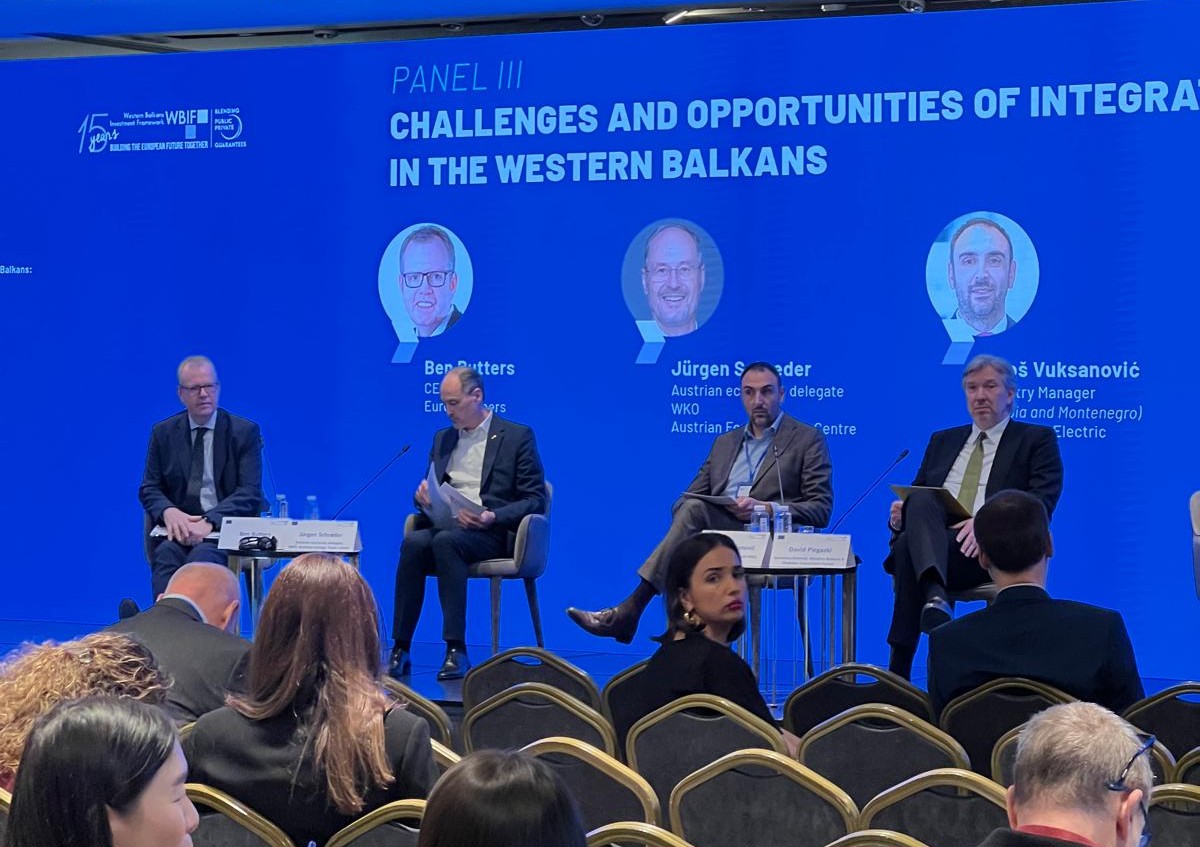
WB6 CIF Secretary General at the “Open4Business” Regional Forum in Belgrade
Newly elected Secretary General of the WB6 CIF, David Piegazki, participated as a speaker during Session III: “Challenges and opportunities of integrating value chains in the Western Balkans” at the event Open4Business: Empowering MSMEs in the Western Balkans – Pathways to the EU.
The regional conference on enhancing the competitiveness of micro, small, and medium-sized enterprises brought together around 500 participants in Belgrade, with 350 B2B meetings scheduled at the forum. The focus of the discussions was on how small and medium-sized enterprises can best leverage new financing instruments.
During the forum it was highlighted that the Growth Plan entails support for the economies of this region and that the reforms, which our governments have committed to, will contribute to improving the business environment by strengthening competitiveness and the rule of law. Micro, small, and medium-sized enterprises represent the backbone of the Western Balkans’ economies and employ more than two-thirds of the working-age population and the longstanding issue that was pointed during the conference was complicated access to financing for exactly those companies. The EU, throughout past years of cooperation, has been actively involved in improving its instruments and helping our companies gain access to knowledge and capital.
Our Secretary General presented the role of the WB6 CIF in advancing regional prosperity and gradual integration to the European market and emphasized that the establishment of our association was a response to fragmented markets and underdeveloped economic governance.
When talking about Driving Regional Economic Integration one of the main topics of the WB6 CIF agenda is the implementation of the Common Regional Market, a central initiative designed to replicate the four freedoms of the EU: free movement of goods, services, capital, and people. Our main contributions related to this was:
- Direct participation in the preparation of strategic policy documents to ensure the voice of the private sector is embedded in policy frameworks.
- Advocating for the removal of non-tariff barriers, the streamlining of customs procedures, and the harmonization of technical standards and regulations in accordance with EU norms.
- Promotion of the mutual recognition of professional qualifications, business licenses, and product certifications across WB economies.
- Supporting public institutions in aligning legislative frameworks and administrative procedures with the requirements of the EU single market.
He added that when we talk about Representing Business Interests in Regional Dialogue, WB6 CIF serves as a strategic mechanism for ensuring the private sector has a seat at the table in both regional and EU-level discussions. This is vital to ensure that regional integration and European alignment are guided by real economic needs. One of the key segments of our work is the EU – WB6 CIF Business Platform, for which meeting recently took place in Brussels and highlighted the urgency of structured, systematic engagement between the EU and WB6 private sectors. Topics such as CBAM preparedness, digital transformation, and labor market mobility were front and center, demonstrating the Chambers’ influence on the future shape of EU-WB relations.
Through the implementation of the WB6 CIF projects, with our partners (EC, DIHK, KfW), our mission is to significantly enhance the business environment and to support enhancing competitiveness of WB6 companies in order to ensure their growth by fostering regional economic cooperation and prepare them for the demands of the European market. In this sense our work is structured around Regional Supplier Development Program (RSDP) and key components of this work include:
- The creation of digital platforms and matchmaking tools to connect SMEs with regional and international buyers.
- Provision of customized market intelligence, including sector-specific analyses and country-level competitiveness analysis.
- Delivery of technical assistance and training for SMEs to achieve EU product compliance, improve production quality, and adopt environmentally sustainable practices.
- Facilitating access to export markets through participation in trade fairs, business delegations, and international B2B events.
He concluded that WB6 CIF is far more than representative institutions, it is strategic enabler of deep economic transformation in the Western Balkans. Through our efforts, we are supporting the region to steadily progress from fragmented markets toward a modern, unified, and EU-aligned economic community.



